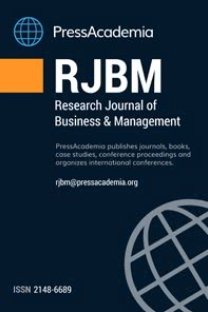Modern işletmeciliğin ortaya çıkmasıyla beraber firma sahipliği ile yönetimi
THE IMPORTANCE OF EMPOWEREMENT IN THE ORGANIZATIONS TO REACH GOALS WITHIN AGENCY THEORY
A distinction has occurred between ownership and management of company owing to emergence of modern business management. Transfer of the administrative authority became indispensable since the administrator's increased responsibilities and guidance capabilities were beyond the expectations of owners in business. The agency problems and costs that constitute the theory are caused by the difference of ownerships and managements in the companies. There within the scope of the agency theory, mutual profit consideration exist between property owner-manager relations. Therefore, the existence of control process that is based on authorization and empowering cannot be disregarded in the relationships within the organization. The empowering states an active workplace where the employees believe that they can shape their job content and role as they wish. This kind of thinking on employee empowerment contributes to the organisational commitment of employees. Because of empowerment efforts, the employees create great commitment to organisational aims and take higher responsibilities for employee performance, work for the benefit of the organisation, provide development and realisation of abilities. Thus, the empowered employees may adopt to changes more. Within the context of this theory, a research has been done on a hundred medium and senior administrators who are working in privately owned university hospital that is operating in Ankara. The data obtained from that survey is analyzed through SPSS 15.0 statistics program. According to these findings, perception of administrative personnel about empowering is measured.
Keywords:
Agency theory, empowerment, delegation of authority agency cost, agency problem,
___
- Akçakaya, M. (2010). Örgütlerde Uygulanan Personel Güçlendirme Yöntemleri: Türk Kamu Yönetiminde Personel
- Güçlendirme, Karadeniz Araştırmaları Dergisi, Bahar 2010, 25, : 145-174.
- Akın, A. (2004). Mülkiyet Sahipliğinden Kaynaklanan Yönetim Hakkının Devri Açısından Post-Modern Yönetsel
- Kontrol Yaklaşımları Ve Stratejileri. Erciyes Üniversitesi İktisadi Ve İdari Bilimler Fakültesi Dergisi, 127-148. Alchian, A.A., Demsetz, H. (2008). Production, Information Costs and Economic Organization. The American Economic Review .62, 777–795.
- Jay B. B., Hesterly W.(1997). Organizational Economics: Understanding The Relationship Between Organizations and Economic Analysis. Handbook of Organization Studies London: Stewart, R. 20.
- Berle, Means, G. C. (1991). The Modern Corporation and Private Property, With a New Introduction by Murray
- Weidenbaum and Mark Jensen, New Jersey, 47-66. Çöl, G. (2008). Algılanan Güçlendirmenin İşgören Performansı Üzerine Etkileri Doğuş Üniversitesi Dergisi, 9 (1), 35
- Çöl, G. (2004). Personel Güçlendirme Kavramının Benzer Yönetim Kavramları ile Karşılaştırılması. İş Güç Dergisi, 2, 7
- Çuhadar, T. (2005). Türk Kamu Yönetiminde Personel Güçlendirme: Sorunlar ve Çözüm Önerileri. Erciyes
- Üniversitesi İktisadi Ve İdari Bilimler Fakültesi Dergisi, Sayı 25. Dalay, İ., Coskun, R. , Altunısık , R. (2002), Stratejik Boyutuyla Modern Yönetim Yaklasımları, Beta Basım Yayım Dagıtım A.Ş., İstanbul.
- Demsetz ,H., Lehn, K.(1985). The Structure of Corporate Ownership: Causes and Consequences. The Journal of Political Economy, l.93,58.
- Donaldson, T. , Preston, L. E. (1995). The Stakeholder Theory Of The Corporation: Conceps, Evidence, and Implications. The Academy Of Management Rewiev, No: 1, 228.
- Donaldson, L., Davıs, J. H. (1991). Stewardship Theory or Agency Theory: CEO Governance and Shareholder
- Returns. Australian Journal of Management, 16, Issue 1, 50. Erstad, M. (1997). Empowerment and organizational change. International Journal of Contemporary Hospitality Management, Vol.9, 325-333.
- Fama, E.F., Jensen, M.C. (1983). Agency Problems and Residual Claims. Journal of Law and Economics, 26, 328.
- Heath, J., Norman W.,(2004). Stakeholder Theory, Corporate Governance and Public Management, What Can The History Of State-run Enterprises Teach Us In The Post-Enron Era?, 178-196.
- Jensen, M., Mecklıng, C., William H.(1976). The Theory of The Firm: Managerial Behaviour, Agency Costs and Ownership Structure, Journal of Financial Economics (JFE), Vol.3, 305-360.
- Jensen, M. J., Murphy, K. C. (1990). Performance Pay and Top Management Incentives. The Journal of Political Economy, 98, 225-264.
- Karahan, A.,Yılmaz, H. (2010). Örgütsel Öğrenme, Personel Güçlendirme ve Takım Performansı Arasındaki
- İlişkilerin Analiz Edilmesi: Sağlık Sektöründe Bir Araştırma. Balıkesir Üniversitesi Sosyal Bilimler Enstitüsü Dergisi, Kahveci, C. (2008). Marmara Üniversitesi Sosyal Bilimler Enstitüsü İşletme Anabilim Dalı Yönetim Ve Organizasyon Bilim Dalı İç Denetimin Vekalet Teorisindeki Yeri Ve Önemi Bir Bankada Yapılan Araştırma. Yüksek
- Lisans Tezi. İstanbul. Koçel, T. (2005). İşletme Yöneticiliği Yönetim ve Organizasyon Organizsyonlarda Davranış Kalsik- Modern- Çağdaş ve Güncel Yaklaşımlar, 10. Bası, Arıkan Basım Yayın Dağıtım Ltd. Şti., İstanbul.
- Çuhadar, T. (2005). Türk Kamu Yönetiminde Personel Güçlendirme: Sorunlar ve Çözüm Önerileri. Erciyes
- Üniversitesi İktisadi Ve İdari Bilimler Fakültesi Dergisi, Sayı 25. Schoorman, D., Donaldson,L., Davis, J. (1997). Towards Stewardship Theory. The Academy Of Management Rewiev, 22, 21.
- Spreıtzer, G. M. (1995). Psychological Empowerment in the Workplace: Dimensions, Measurement, And Validation. Academy of Management Journal, 38, 1442-1465.
- Spreitzer, G.M. (2007). Taking Stock: A Review of More Than Twenty Years of Research On Empowerment At
- Work. In C. Cooper, J. Barling, ed., Handbook of Organizational Behavior, Sage Publications.” Şahin, N. (2007). Personel Güçlendirmenin İş Tatmini ve Örgütsel Bağlılık Üzerine Etkisi: Dört ve Beşs Yıldızlı Otel
- İşletmelerinde Bir Uygulama. Dokuz Eylül Üniversitesi Sosyal Bilimler Enstitüsü, Doktora Tezi, İzmir. Şen, A. (2006). Asimetrik Bilgi- Finansal Kriz İlişkisi. Dumlupınar Üniversitesi Sosyal Bilimler Dergisi, 14, 9-10.
- Ülgen, H. Mirze S. K. (2006). İşletmelerde Stratejik Yönetim, İstanbul, 3. baskı, Literatür Yayınları, İstanbul, 427.
- Yayın Aralığı: Yılda 4 Sayı
- Başlangıç: 2014
- Yayıncı: PressAcademia
